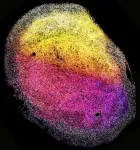(Press-News.org) JACKSONVILLE, Florida — New research from Mayo Clinic suggests that artificial intelligence (AI) could improve the diagnosis of peripartum cardiomyopathy, a potentially life-threatening and treatable condition that weakens the heart muscle of women during pregnancy or in the months after giving birth. Researchers used an AI-enabled digital stethoscope that captures electrocardiogram (ECG) data and heart sounds to identify twice as many cases of peripartum cardiomyopathy as compared to regular care, according to a news release from the American Heart Association.
Identifying a weak heart pump caused by pregnancy is important because the symptoms, such as shortness of breath when lying down, swelling of hands and feet, weight gain, and rapid heartbeat, can be confused with normal symptoms of pregnancy.
Dr. Demilade Adedinsewo, a cardiologist at Mayo Clinic, led the research.
Women in Nigeria have the highest reported incidence of peripartum cardiomyopathy. The randomized pragmatic clinical trial enrolled 1,195 women receiving pregnancy care in Nigeria. Approximately half were evaluated with AI-guided screening using the digital stethoscope, and half received usual obstetric care in addition to a clinical ECG. An echocardiogram was used to confirm when the AI-enabled digital stethoscope predicted peripartum cardiomyopathy. Overall, 4% of the pregnant and postpartum women in the intervention arm of the clinical trial had cardiomyopathy compared to 2% in the control arm, suggesting that half are likely undetected with usual care.
Watch: Dr. Adedinsewo explains the red flags for heart failure during pregnancy
###
About Mayo Clinic
Mayo Clinic is a nonprofit organization committed to innovation in clinical practice, education and research, and providing compassion, expertise and answers to everyone who needs healing. Visit the Mayo Clinic News Network for additional Mayo Clinic news.
END
Clinical research shows AI-enabled digital stethoscope can detect pregnancy-related heart disease
2024-01-08
ELSE PRESS RELEASES FROM THIS DATE:
Franco-German research funding in the field of biology
2024-01-08
The joint funding program of the French National Research Agency (ANR) and the German Research Foundation (DFG) promotes Franco-German cooperation in the natural sciences, the life sciences, and the engineering sciences. Through this program, Johannes Gutenberg University Mainz (JGU) will receive support for two distinctive projects in the field of biology.
The EVOMET project: Uncovering the evolution of metabolism in plants
Tomatoes, cucumbers, and potatoes taste different due to the accumulation ...
Fastest swimming insect could inspire uncrewed boat designs
2024-01-08
ITHACA, N.Y. – Whirligig beetles, the world’s fastest-swimming insect, achieve surprising speeds by employing a strategy shared by speedy marine mammals and waterfowl, according to a new Cornell University study that rewrites previous explanations of the physics involved.
The centimeter-long beetles can reach a peak acceleration of 100 meters per second and a top velocity of 100 body lengths per second (or one meter per second).
Not only do the results explain the whirligig’s Olympian speeds, but they also offer valuable insights for bio-inspired designers of near-surface water robots and uncrewed boats.
Until ...
Why do we sleep? Researchers propose an answer to this age-old question
2024-01-08
Sleep is a fundamental need, just like food or water. “You’ll die without it,” said Keith Hengen, an assistant professor of biology at Washington University in St. Louis. But what does sleep actually accomplish? For years, the best researchers could say is that sleep reduces sleepiness — hardly a satisfying explanation for a basic requirement of life.
But by melding concepts from the fields of physics and biology, Hengen and a team of Arts & Sciences researchers have constructed a theory that could explain both the meaning of sleep and the complexity of the brain. As reported in a new study published ...
Singh studying distributed computing models and algorithms for pervasive systems
2024-01-08
Gurdip Singh, Divisional Dean, School of Computing, received funding from the National Science Foundation for the project: "EAGER: Distributed Computing Models and Algorithms for Pervasive Systems."
The goal of this project is to extend the traditional graph-based distributed computing models and algorithms to develop a unified model to study cyber-physical systems. The unified models will capture interactions between the physical and cyber entities and the physical phenomena. This project also proposes to develop techniques to design distributed algorithms for fundamental problems ...
Narayanan developing treatments for alphaviruses
2024-01-08
Aarthi Narayanan, Professor, Biology, received funding for the project: "Further the development of Omaveloxolone and Bardoxolone methyl as broadly effective countermeasures against alphaviruses to Support the Battelle Accelerated Therapeutics for Combating Acute Viral Epidemics (BAT-CAVE) Program."
The principal purpose of this program is to conduct Research and Development into medical, pharmaceutical, and diagnostic technologies to enhance mission effectiveness of military personnel, collaborating ...
SwRI awarded $54 million contract to develop QuickSounder weather satellite
2024-01-08
SAN ANTONIO — January 8, 2024 —NASA and NOAA have selected Southwest Research Institute (SwRI) to develop QuickSounder, the first in a new generation of NOAA low-Earth orbit environmental satellites. Under the $54 million contract, SwRI will design and build the satellite and operate it for three years.
QuickSounder will kick off NOAA’s Near Earth Orbit Network (NEON) program. The Near Earth Orbit Network is a collaborative mission between NASA and NOAA. NASA will manage the development and launch of the satellites for NOAA, which will operate them and deliver data to users worldwide. NEON satellites ...
Novel tissue-derived brain organoids could revolutionize brain research
2024-01-08
Press release – Princess Máxima Center for pediatric oncology
EMBARGO: 8 JANUARY 2024 AT 11:00 AM ET (US)
Scientists have developed 3D mini-organs from human fetal brain tissue that self-organize in vitro. These lab-grown organoids open up a brand-new way of studying how the brain develops. They also offer a valuable means to study the development and treatment of diseases related to brain development, including brain tumors.
Scientists use different ways to model the biology of healthy tissue and disease in the lab. These include cell lines, laboratory animals and, since a few years, 3D mini-organs. ...
SARS-CoV-2 BA.2.86 is less resistant to vaccine, but may be a problem in the lung
2024-01-08
COLUMBUS, Ohio – New research shows that the recently emerged BA.2.86 omicron subvariant of the virus that causes COVID-19 can be neutralized by bivalent mRNA vaccine-induced antibodies in the blood, which explains why this variant did not cause a widespread surge as previously feared.
However, the study in cell cultures showed this SARS-CoV-2 variant can infect human cells that line the lower lung and engage in virus-host cell membrane fusion more efficiently, two features linked to severe disease symptoms.
The study is published today (Jan. 8, 2024) in the journal Cell.
The BA.2.86 variant of omicron is the ancestor of the currently dominating JN.1 and has about ...
Sibling death in childhood and early adulthood and risk of early-onset cardiovascular disease
2024-01-08
About The Study: In this study of more than 2 million individuals born in Denmark, sibling death in childhood and early adulthood was associated with increased risks of overall and most type-specific early-onset cardiovascular diseases, with the strength of associations varying by cause of death and age difference between sibling pairs. The findings highlight the need for extra attention and support to the bereaved siblings to reduce cardiovascular disease risk later in life.
Authors: Guoyou Qin, Ph.D., and Yongfu Yu, Ph.D., ...
Early-life digital media experiences and development of atypical sensory processing
2024-01-08
About The Study: Early-life digital media exposure was associated with atypical sensory processing outcomes in multiple domains in this study that included 1,471 children. These findings suggest that digital media exposure might be a potential risk factor for the development of atypical sensory profiles. Further research is needed to understand the relationship between screen time and specific sensory-related developmental and behavioral outcomes, and whether minimizing early-life exposure can improve subsequent sensory-related outcomes.
Authors: Karen F. Heffler, M.D., of the Drexel University ...


